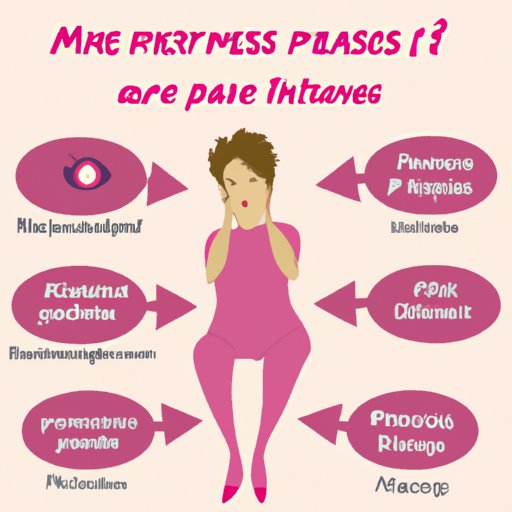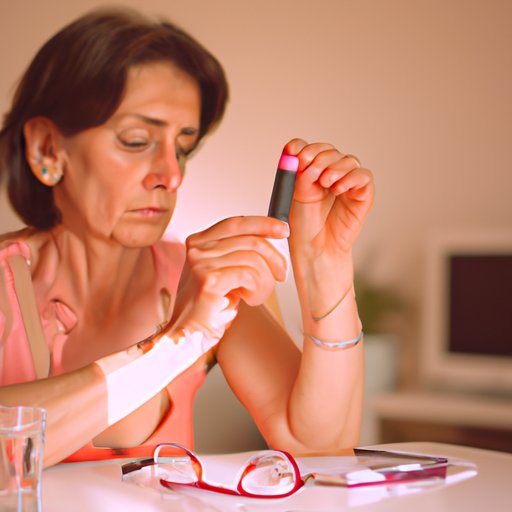
Introduction
Menopause is a natural part of every woman’s life. However, it often comes with symptoms that can be disruptive and uncomfortable. These symptoms can vary from woman to woman, both in terms of severity and type. As hormone levels begin to fluctuate, women may experience a variety of physical and emotional symptoms. This article will explore the six worst menopause symptoms in-depth and provide practical advice for managing them.
The Top 6 Most Debilitating Menopause Symptoms: What You Need to Know
Hot flashes, night sweats, mood swings, fatigue, vaginal dryness, and insomnia are the most common and debilitating menopause symptoms. According to the North American Menopause Society, approximately 80% of women experience hot flashes and night sweats during menopause, and 20-30% of women experience mood changes that can significantly impact their daily life.
These symptoms can last for several years, significantly interfering with a woman’s quality of life. For instance, hot flashes can cause embarrassment and interfere with one’s daily activities. Conversely, insomnia can cause daytime fatigue and an overall decreased quality of life. Many women report feelings of depression and anxiety due to these symptoms.
Personal stories from women who have experienced these symptoms are varied and numerous. Many women report experiencing mood swings that can be severe and intrusive, affecting their interactions with loved ones. Others experience hot flashes that disrupt their sleep patterns and interfere with their work lives. Countless women report feeling overwhelmed and isolated when trying to manage these symptoms alone.

Surviving Menopause: The Worst Symptoms and How to Manage Them
There are several treatment options available for women experiencing the worst menopause symptoms. These include lifestyle changes, alternative therapies, supplements, and medical treatments. For lifestyle changes, it is recommended to exercise regularly, manage stressors, and adjust your diet. Additionally, many women find relief through alternative therapies such as meditation, yoga, and acupuncture. Supplements such as black cohosh and vitamin E can be used to alleviate certain symptoms.
Medical treatments may include hormone replacement therapy (HRT), antidepressants, or other prescription medications that have shown promising results in managing the worst symptoms. Healthcare professionals, such as gynecologists and endocrinologists, can provide guidance on which treatment options are best for individual women.
Real-life examples of women who have successfully managed their symptoms abound. Many women report feeling significantly better once they find a treatment plan and routine that work for them. It may take some trial and error, but it is possible to find symptom relief and a better quality of life. Individualized care and partnership with healthcare providers can be vital in managing severe menopause symptoms.
Breaking Down Menopause Symptoms: The Ones That Will Make You Miserable
Hot flashes and night sweats occur due to changes in the hypothalamus, the part of the brain that regulates body temperature. Mood changes are typically due to fluctuating hormone levels, specifically estrogen and progesterone. Vaginal dryness is caused by decreased estrogen levels, which can lead to itching and discomfort in the vaginal area. Insomnia and fatigue can result from hot flashes and mood changes, as well as a decrease in testosterone levels.
These symptoms can be difficult to manage due to their unpredictable and fluctuating nature. Additionally, some treatments may have side effects or may not work well for certain women. For example, not all women are good candidates for HRT, and some may experience unwanted side effects from prescription medications. It is essential to find a treatment plan that works best for an individual woman’s needs and lifestyle.
Menopause Misery: The 6 Most Common and Uncomfortable Symptoms
Personal stories from women who have experienced these symptoms are essential to understanding how menopause affects women across the board. Women may share how their symptoms have impacted their work, personal relationships, and overall quality of life. Some women have found relief through exercise, diet, and alternative therapies, while others may require prescription medication to manage their symptoms.
Expert advice from healthcare providers is essential in managing these symptoms effectively. Gynecologists, endocrinologists, and other medical professionals can provide crucial guidance on which treatment options are best suited to individual women. Additionally, many women find that talking to other women going through menopause can provide much-needed support and understanding during this time of transition.
Navigating the Menopause Maze: Understanding and Coping with the Top Symptoms
There are several treatment options available for women experiencing the worst menopause symptoms. Hormone replacement therapy can provide significant relief for many women, while antidepressants and anti-anxiety medications may be necessary for others. Alternative therapies such as meditation, yoga, and acupuncture can alleviate some symptoms and provide stress relief. Exercise, a healthy diet, and stress management techniques such as deep breathing and mindfulness meditation can also be helpful.
It can be challenging to find the best treatment plan for each individual woman’s needs. A healthcare professional can provide vital guidance in selecting the best treatment option. Additionally, women can experiment with different natural remedies and lifestyle changes to see what works best for them.
Menopause Mayhem: How to Deal with the 6 Worst Symptoms for a Smoother Transition
To deal with the worst symptoms of menopause, it is crucial to prioritize self-care and seek out support from loved ones and healthcare professionals. Regular exercise, stress management techniques, a healthy diet, and adequate sleep can all contribute to easing the transition. Additionally, women should not hesitate to seek out medical treatment if needed.
Lastly, it is important to remember that each woman’s experience of menopause is unique. There is no one-size-fits-all treatment plan, and there is no reason to suffer alone. With patience, perseverance, and support from loved ones and healthcare professionals, women can successfully manage the worst menopause symptoms and transition to this new phase of life with grace.
Conclusion
Managing the worst menopause symptoms can be challenging, but it is not impossible. There are many lifestyle changes, alternative therapies, supplements, and medical treatments available to alleviate these symptoms and improve quality of life. Furthermore, seeking support from healthcare professionals and peers going through this experience can also be incredibly helpful. Above all, it is essential for women to prioritize self-care and remember that a successful transition is possible.
Resources
- North American Menopause Society: Most Common Menopause Symptoms
- Mayo Clinic: Menopause
- Healthline:




